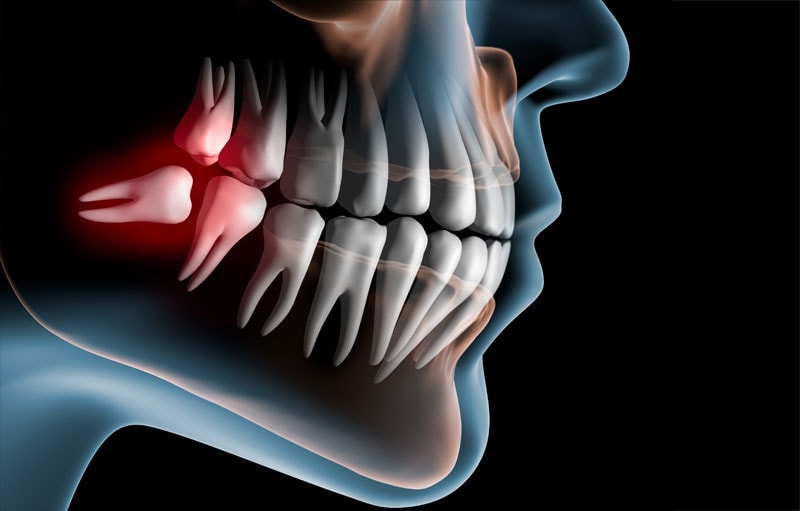What Are Impacted Wisdom Teeth?
9/10 people have at least one impacted wisdom tooth! This is the primary reason they are removed.
When wisdom teeth become impacted, they don’t have space to develop and be functioning teeth. Impacted teeth can grow into your mouth sideways, backward, titled, or sometimes they don’t grow in at all. These teeth can cause pain, discomfort, damage to other teeth, and other dental health issues. They have a significant risk of becoming infected or fracturing your jaw, and this makes it necessary for a surgeon to remove them preventatively.
Wisdom teeth become impacted because they don’t have enough room to come in or develop in the usual way. They are the 3rd molars in the very back of your mouth, and the last teeth to come in. Traditionally, they will erupt between ages 17-25 and a majority of people have 4 wisdom teeth, 2 on top and 2 on bottom. Ideally, your wisdom teeth would grow in and align themselves with your other teeth, causing no issues. In many cases, the mouth is too crowded for your teeth to have proper development, and crowded molars become impacted.
You can have partially impacted teeth, or fully impacted teeth depending on how much space your mouth allows for. If some of the crown is visible and breaks through the gums, that means it’s partially impacted. Partially impacted teeth can still be facing the wrong direction.
Complications can arise with fully emerged molars, impacted molars, and partially impacted molars.
- Cysts: when your teeth become infected, your body will automatically create a sac within the jaw bone in order to make healing space in the area. Unfortunately, this space can fill with fluid, which creates a cyst that can damage teeth, nerves, and the jawbone. If the problem isn’t managed, there’s a small chance you can develop a tumor which has a more complicated removal process than the cyst does.
- Decay: wisdom teeth are at a higher risk of developing cavities compared to other teeth. This is because the teeth are so far back in your mouth and they are harder to clean. Brushing and flossing these teeth and the area can be a lot more difficult.
- Gum disease: since cleaning is difficult, food and bacteria can easily get trapped in partial holes, or around erupted wisdom teeth. You’re more likely to have issues with painful gums in this area if you’re unable to keep them clean.
When impacted wisdom teeth do get infected or cause other dental issues, you may have some of the following symptoms:
- Red or swollen gums
- Tender or bleeding gums
- Jaw pain
- Swelling around the jaw
- Bad breath
- An unpleasant taste in your mouth
- A hard time opening your mouth
You can’t stop your wisdom teeth from being impacted, but you can ensure you take care of them no matter how they come in. Keep up with your dental check-ups every 6 months to keep an eye on the development of your wisdom teeth, impacted or not. If your teeth are slow to come in and impacted, talk to your dentist about seeing an oral surgeon to have them removed before they cause you issues. X-rays will show impacted wisdom teeth before any symptoms start.


